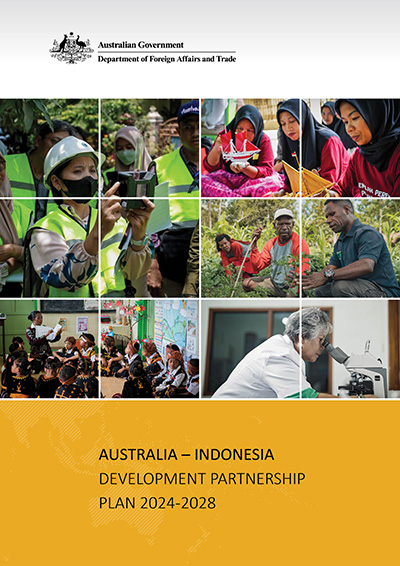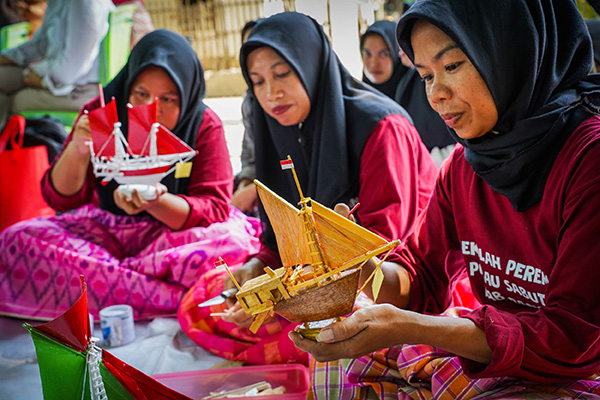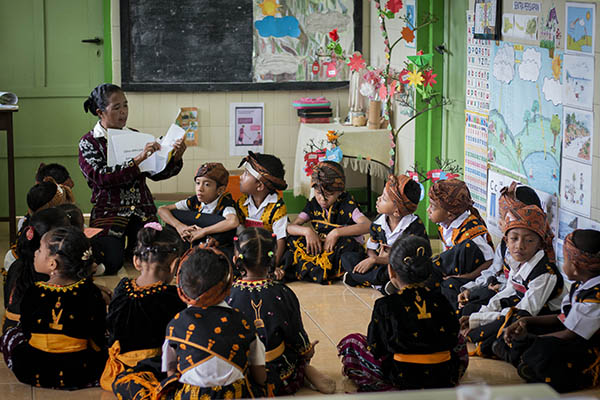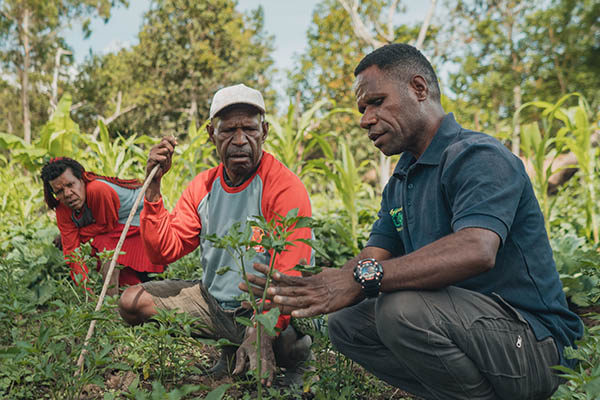-
2025-26 bilateral allocation [budget estimate]
-
$319.3 million
-
2025-26 total Australian ODA [budget estimate]
-
$351.4 million
-
2024-25 bilateral allocation [budget estimate]
-
$312.1 million
-
2024-25 total Australian ODA [budget estimate]
-
$353.7 million
-
2023-24 total Australian ODA [actual]
-
$329.1 million
Australia and Indonesia are close neighbours, strategic partners and friends. The Australia–Indonesia Comprehensive Strategic Partnership elevates our bilateral relationship and sets an ambitious agenda for deeper and broader cooperation. We are committed to working together to promote peace and stability across the Indo-Pacific region. Our countries continue to draw closer together as partners in economic growth, trade, security, development and education. Our partnership is underpinned by strong and enduring institutional and people-to-people links.
Indonesia and Australia share bright economic growth prospects and economic complementarity, and are partners in the global transition to net zero. We are committed to deepening trade and investment ties under the Indonesia–Australia Comprehensive Economic Partnership Agreement (IA-CEPA) and Invested: Australia's Southeast Asia Economic Strategy to 2040, and to supporting Indonesia's development ambitions as articulated in its National Long-Term Development Plan 2025–2045 – Rencana Pembangunan Jangka Panjang Nasional 2025–2045 (RPJPN). As a major economy in the region and globally, Australia sees Indonesia's success as pivotal to the success of our region.
Joint Objectives of the Australia-Indonesia development partnership
The overarching goal for the Australia-Indonesia development partnership is to promote Indonesia's prosperity, stability and resilience, and build strong links between our two countries.
The Australia-Indonesia Development Partnership Plan 2024-2028 (DPP) translates into action the development priorities Australia shares with Indonesia. The DPP sets out agreed objectives, how we will work together to deliver shared outcomes, and how progress will be monitored.
Objective 1 - Equitable and sustainable economic transformation
We will support Indonesia's economic transformation through investment in economic governance, trade, infrastructure, research and innovation. In line with Invested: Australia's Southeast Economic Strategy 2040, we will work with Indonesia to strengthen our strategic economic cooperation for mutual benefit, through ODA and non-ODA investments, across government, regional organisations and private sector. We will also support Indonesia's human development and service delivery efforts, promoting transparent and effective governance, assisting Indonesia's ambition for vulnerable groups to access services safely and share in economic growth.
Objective 2 - Climate resilient communities
With the Australia-Indonesia Climate and Infrastructure Partnership, KINETIK, as a centrepiece, we will support Indonesia's energy transition. Our infrastructure investments will assist Indonesia to build and develop climate change-resilient and climate-smart infrastructure and to manage its water resources. We will partner with Indonesia to prepare for climate related disasters, natural disasters and threats to human and animal health. We will also provide technical support for climate adaptive policies and services.
Objective 3 - Strong institutions
We will work with Indonesia to support its priorities for resilient, transparent and accountable institutions and governance. Ensuring justice for all, including women, girls and persons with disability, will underpin these efforts. We will draw on our deep, historical institutional links with Indonesia across courts, law enforcement and criminal justice systems. Together, we will work to encourage inclusive participation in democratic processes, religious tolerance and mutual understanding between our countries, engaging with government, research institutions, civil society, media and communities, including vulnerable groups. We will work with national and local government officials to strengthen governance across Indonesia's decentralised system, to deliver better services and infrastructure across the archipelago.
Climate change
Climate change will impact all sectors. The Asian Development Bank estimates that, without effective global climate action, climate change could cost Indonesia between 2.5 per cent and 7 per cent of GDP by 2100. Indonesia has invested in its disaster risk management systems and is seen as a leader in the region. Indonesia's high population density in hazard-prone areas and dependence on a natural resource-based economy make it highly vulnerable to climate change impacts. The risks of food insecurity, coastal population displacement and damage to the economy may compound and cascade to intensify and extend these effects.
Indonesia and Australia face common challenges in transitioning our respective economies to net zero. Our development program will support Indonesia to adapt its energy sectors to scale renewable energy and balance this transformation with development goals and societal expectations to ensure a just transition. Both countries recognise that innovative approaches are needed to drive the transition. This offers opportunities to catalyse public and private investment in technology, develop new businesses and industries, share knowledge and innovation, and build the human capital needed to service the rapidly growing green economy. Australia offers substantial and quickly evolving capability in energy transition including in policy and regulatory reform, finance, technical assistance and energy efficiency. The Australia-Indonesia Climate and Infrastructure Partnership, KINETIK, will build a long-term platform for cooperation on energy transition.
We will also ensure that climate change risks and adaptation are considered across the entirety of the development partnership, both in new programs and incorporating climate change into existing programs, particularly in climate-sensitive sectors. Australia and Indonesia will work in partnership to develop policies that respond to climate change, and use innovative finance mechanisms to increase investment in climate-positive businesses.
Gender Equality, Disability and Social Inclusion (GEDSI)
Indonesia is committed to 'leaving no one behind', including in addressing the needs of women, children, people with disability, the elderly and adat (traditional) communities. The RPJPN maintains a priority focus on inclusive communities and gender equality. More broadly, Indonesia is aware that enabling all Indonesians to participate in and benefit from Indonesia's development is central to achieving the objectives of the RPJPN. This includes work to strengthen access to services, create economic opportunities, facilitate community involvement in development planning, and address gender-based violence. Australia will continue to work in partnership with the Government of Indonesia, civil society and communities to encourage inclusion across Indonesia's socio-cultural, economic and political development, and equal distribution of development gains.
National policy frameworks support gender equality and inclusion objectives, and efforts are underway to translate these policies into action. This is supported by Indonesia's work to embed a gender mainstreaming approach into policy development and implementation, and collaborate with civil society to advance gender equality, disability rights, food security and social inclusion. Australia has mainstreamed GEDSI objectives across all investments in the Australia-Indonesia bilateral development cooperation program. We work in areas based on shared priorities and are well placed to continue this support.
We support Indonesia's ambition for vulnerable groups to be able to access services safely and share in Indonesia's economic growth. We have provided technical assistance to advance GEDSI where it is most effective, including supporting the development of childcare policies, and capacity building for women to establish and manage businesses. Regional gender equality initiatives, including those with the Association of Southeast Asian Nations (ASEAN), will also contribute to resilient, inclusive and sustainable economic growth in Indonesia.





